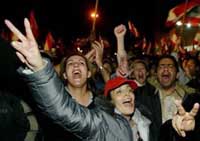Opposition protesters block roads to enforce strike meant to topple Lebanon government
Opposition protesters paralyzed Lebanon Tuesday by burning tires and cars at major thoroughfares in the capital and its approaches to enforce a general strike that aims to topple the government.

Clustering in small groups to man the blazing roadblocks, opposition supporters escalated their nearly two-month protest. Commuters were stranded and an eery silence hung over many commercial districts.
Scattered violence was reported. Police said seven people sustained gunshot wounds in disturbances between opposition supporters and pro-government activists in central and northern Lebanon. Michel Aoun, a senior opposition leader, told Al-Arabiya television that the seven wounded were opposition members.
Police and troops deployed in the thousands across the country worked to open roads, sometimes negotiating with protesters, but they refrained from using force. In some instances, the military separated the two opposing sides who scuffled and exchange insults and stones.
Hezbollah chief Sheik Hassan Nasrallah and other opposition leaders called the strike that was backed by labor unions. Prime Minister Fuad Saniora and his supporters urged Lebanese to ignore the call, a move endorsed by banking associations and business leaders.
Soldiers and firefighters moved in to remove the obstacles, but black clouds could be seen billowing into the air around the capital and on major highways in testament to their limited success.
Witness accounts and television footage suggest that the opposition had shut down many neighborhoods and suburbs of the capital, Beirut, as well as areas around the country. But Beirut Mayor Abdel-Munim Ariss, put on a brave face, telling Al-Arabiya television the city was functioning normally.
Many workers stayed home, either in support of the strike or simply fearing violence. Some schools which had earlier said they were open sent mobile text messages to parents announcing closures because of the unrest.
Blazing roadblocks cut off the road to Beirut international airport and the highway linking Beirut with the mountains and the road to Damascus, the Syrian capital.
Aviation officials said the country's only international airport was operating as normal, albeit with fewer staff.
The director general of Civil Aviation, Hamdi Shawq, told Al-Arabiya that the airport was working, but passengers were having difficulty reaching and leaving it by road.
Five flights arrived at the airport, six others left but another seven flights were canceled.
Government officials described the disturbances as an attempted coup.
"It is one of the chapters of the putsch," said Telecommunications Minister Marwan Hamadeh said of the opposition action. "This will fail as in the past, and the legitimate government of Lebanon will remain steadfast," he told Al-Arabiya television. In another television interview, he called the protesters "thugs."
Another Cabinet minister, Ahmed Fatfat, expressed concern that there would be more violence between the rival sides.
"The opposition is attempting a coup by force ... This is not a strike. This is military action, a true aggression and I'm afraid this could develop into clashes between citizens," Fatfat, the youth and sports minister, told Al-Arabiya.
The strike came two days before Saniora and his economic team seek financial aid for Lebanon at an international donors' conference in Paris. The opposition has also said the grants and loans which local analysts set at around US$5 billion (Ђ3.1 billion) would only increase the national debt and further weaken the economy, hard hit by the summer war between Hezbollah guerrillas and Israel.
A Saniora aide, speaking on condition of anonymity, said the prime minister was still in Beirut following the developments, contrary to earlier media reports that he had left for France.
The strike has deepened the existing political divisions.The anti-Syrian parliamentary majority, made up of mostly Sunni Muslims, Druse and Christians, backs Saniora. The opposition is led by the pro-Syrian and pro-Iranian Shiite Muslim Hezbollah, and includes also some Druse and Christians.
The opposition has been camped out in front of the prime minister's office in downtown Beirut and staged several protests to press its demands since Dec. 1. Troops have been deployed in central Beirut for weeks to keep order. But the action has largely been peaceful.
Nasrallah urged supporters late Monday to participate in an "effective and powerful manner" in the strike. He reiterated the demand by Hezbollah and its allies for a veto-wielding share of the Cabinet a request that Saniora has rejected.
Hours earlier, Saniora criticized Hezbollah's tactics, saying the Iranian and Syrian backed group wanted to give the world "a disturbing picture of Lebanon."
Subscribe to Pravda.Ru Telegram channel, Facebook, RSS!




